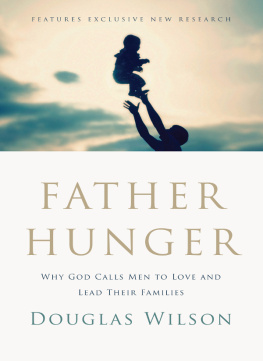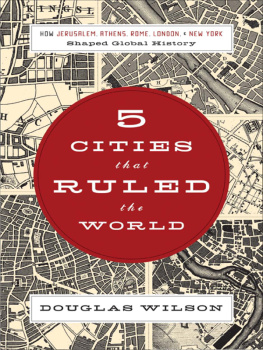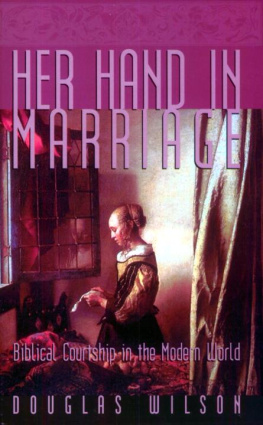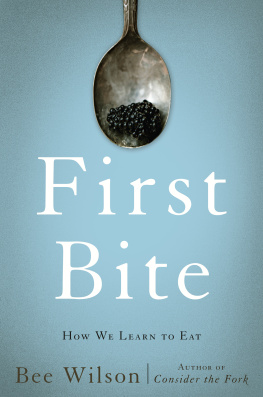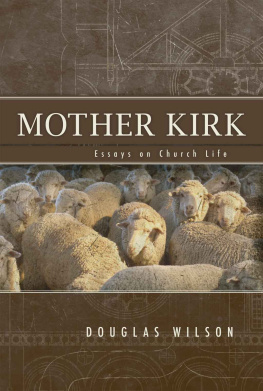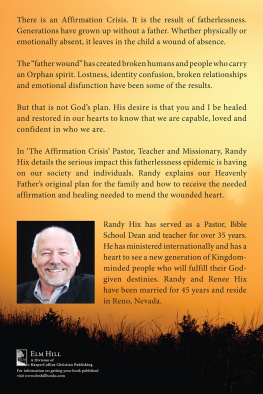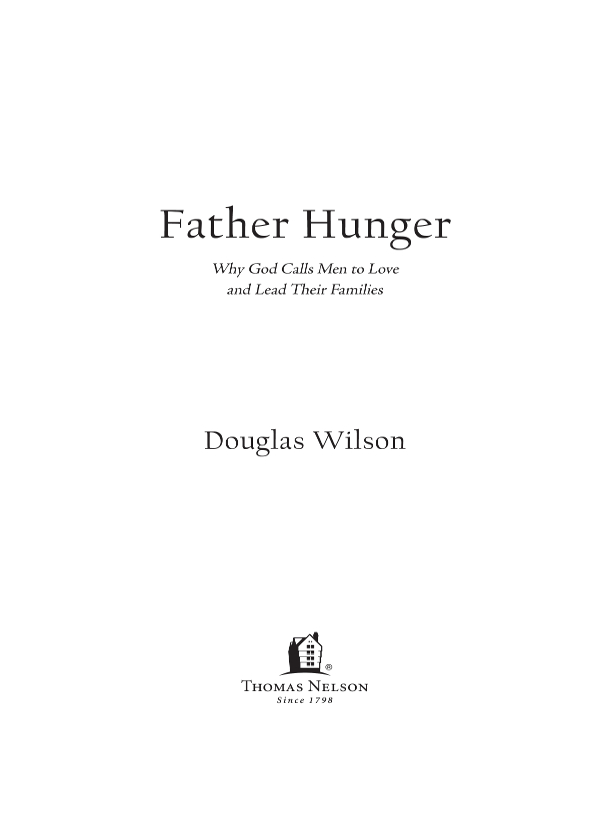2012 by Douglas James Wilson
All rights reserved. No portion of this book may be reproduced, stored in a retrieval system, or transmitted in any form or by any meanselectronic, mechanical, photocopy, recording, scanning, or otherexcept for brief quotations in critical reviews or articles, without the prior written permission of the publisher.
Published in Nashville, Tennessee, by Thomas Nelson. Thomas Nelson is a registered trademark of Thomas Nelson, Inc .
Thomas Nelson, Inc ., titles may be purchased in bulk for educational, business, fund-raising, or sales promotional use. For information, please e-mail SpecialMarkets@ThomasNelson.com.
Unless otherwise noted, Scripture quotations are taken from THE ENGLISH STANDARD VERSION . Copyright 2001 by Crossway Bibles, a division of Good News Publishers.
Scripture quotations marked KJV are from the King James Version.
Italics in Scripture quotations reflect the authors added emphasis.
Library of Congress Cataloging-in-Publication Data
Wilson, Douglas, 1953
Father hunger : why God calls men to love and lead their families / Douglas Wilson.
p. cm.
Includes bibliographical references (p.) and index.
ISBN 978-1-59555-476-5
1. Fatherhood--Religious aspects--Christianity. 2. Fathers--Religious life. I. Title.
BV4529.17.W557 2012
248.8'421--dc23
12 13 14 15 QG 6 5 4 3 2 1
Information about External Hyperlinks in this ebook
Please note that footnotes in this ebook may contain hyperlinks to external websites as part of bibliographic citations. These hyperlinks have not been activated by the publisher, who cannot verify the accuracy of these links beyond the date of publication.
For James Irwin Wilson, a true father.
This book is dedicated to him, a man I have respected
as long as I can remember, and as deep as I go.
Grandchildren are the crown of the aged,
and the glory of children is their fathers.
Proverbs 17:6
C ONTENTS
Chapter 1
F IRST W ORDS
I once heard a conference speaker make a profound point in passing, a point that has stayed with me in the years since. He said that the first recorded words spoken by a human being were the words spoken by Adam when the Lord presented his wife to him. When Adam first spoke, it was in response to a woman, and the words he spoke were poetry. We really need to learn how to take more careful notice of those opening words.
We should pay special attention also to the first words spoken by the Father of Jesus Christ at the beginning of the New Testament. We know from all of Scripture that God is the Father of Jesus ChristHe is God the Father, after allbut these opening words tell us a great deal about what this archetypal fatherhood is like.
And when Jesus was baptized, immediately he went up from the water, and behold, the heavens were opened to him, and he saw the Spirit of God descending like a dove and coming to rest on him; and behold, a voice from heaven said, This is my beloved Son, with whom I am well pleased. (Matt. 3:1617)
There is a world of information about fatherhood in these two brief verses. First, when Jesus was baptized, His Father was there. Second, He made His presence felt by sending His Spirit to descend like a dove in order to rest upon Jesus. Third, He made His presence known by speaking. And so what did He say? His statement corresponded with the giving of the Spirit in that the Father identified with His Son. He said, This is my Son. Fourth, He expressed His love for His SonThis is my beloved Son. And last, He expressed His pleasure in His Son. The first thing we are told about the relationship of the Father to the Son is that the Father thought His Son was doing a great job.
So this is what fatherhood is like. This is where fatherhood reaches its ultimate expression. In human history, there will never be a more perfect father-and-son moment than this moment between Father and Son. This is the keynotepleasure. This is the pitch that a father/son relationship needs to matchwell pleased.
When we dont match that pitch, a lot of things start going wrong. In fact, so many things start going wrong that we sometimes miss the source of all the trouble. In our generation we are confronted with many social dislocations that all go back to a foundational father hunger. All men are the son of some man, and all women are the daughter of some man, but far too many of them have never heard their father say anything like what the Father said to His Son.
Well pleased is an alien concept to many of us, and because it is so unknown, we have a great deal of cultural debris to work through. That being the case, we should perhaps get started.
As we look around, we know that we are broken, but we somehow assume that our notions of fatherhood are intact. But perhaps it goes the other way. Perhaps our world is as broken as it is because our understanding of fatherhood was shattered first. Mike Wilkerson puts it this way
Tragically, for many of us the Father-child relationship is fraught with fear, shame, dread, disappointment, or absence. For some of us... the word father has been darkened by the worst evils. Can you ever hope to know God as your Father if your view of father is so broken?
But this problem can be turned around, and should be turned around. Our understanding of fathers, and our subsequent understanding of everything else, cannot be put right until we rediscover the Father. This is not written for unbelievers alone. There are many professing Christians who are emotional atheists. We may hold onto orthodox ideas about [the Father], but our hearts disconnect, says Wilkerson; our affection cools; we just dont trust him. We assume too readily that it is impossible for us to turn back to the face of the Father, but there actually is good news for people just like us.
Like the father in the story that Jesus told about the prodigal son, He is looking down the road for us.
Chapter 2
W HAT F ATHERS A RE F OR
After being introduced to the principles that undergird this book, one young father once exclaimed, Now I know what I am for! Fatherhood is not some optional add-on extra, but rather is something central, not just to a well-adjusted suburban family with all the white picket fence trimmings, but to all things in heaven and on earth. Fathers really do matter.
Much of what will be argued throughout the course of this book will not seem very enlightened or progressive to todays average reader, and so we must begin by addressing the problems created by something called egalitarianism. We shouldnt be put off by this elongated wordwe all know plenty of other big words that dont bother us, like delicatessen or basketball. Egalitarianism simply means equalism, and like a number of other similar words, the poison in that word is found in the ism.
Now of course we know and agree that there is an important sense in which we are all supposed to be treated as equals. In a court of law, for example, we know that the rules governing admissible evidence should not vary in accordance with the income bracket of the defendant. And this kind of equality in our human courts is, at its best, a reflection of the equality we can expect to find before the throne of God on the final Day of Judgment. Blondes will not get favored treatment there, and neither will men who graduated from an Ivy League school. That boyish grin that got you through so many scrapes as a young man will have lost a good deal of its persuasive charm.

